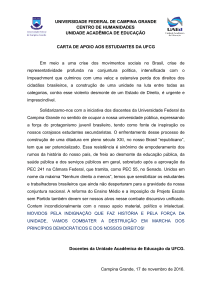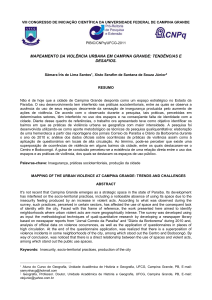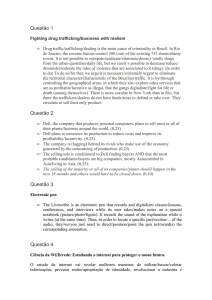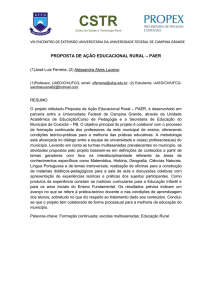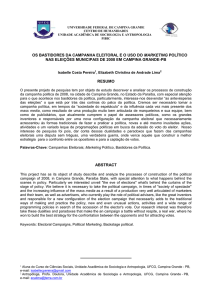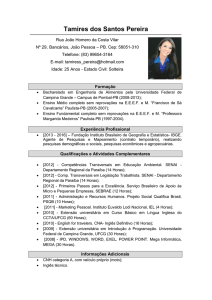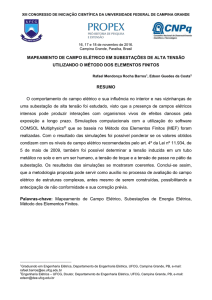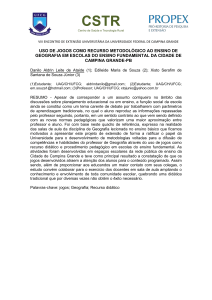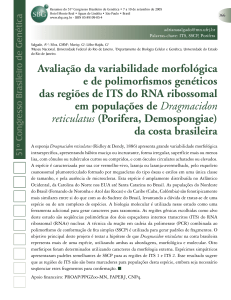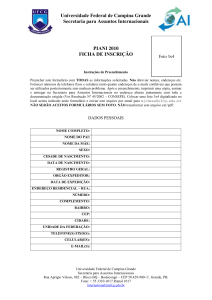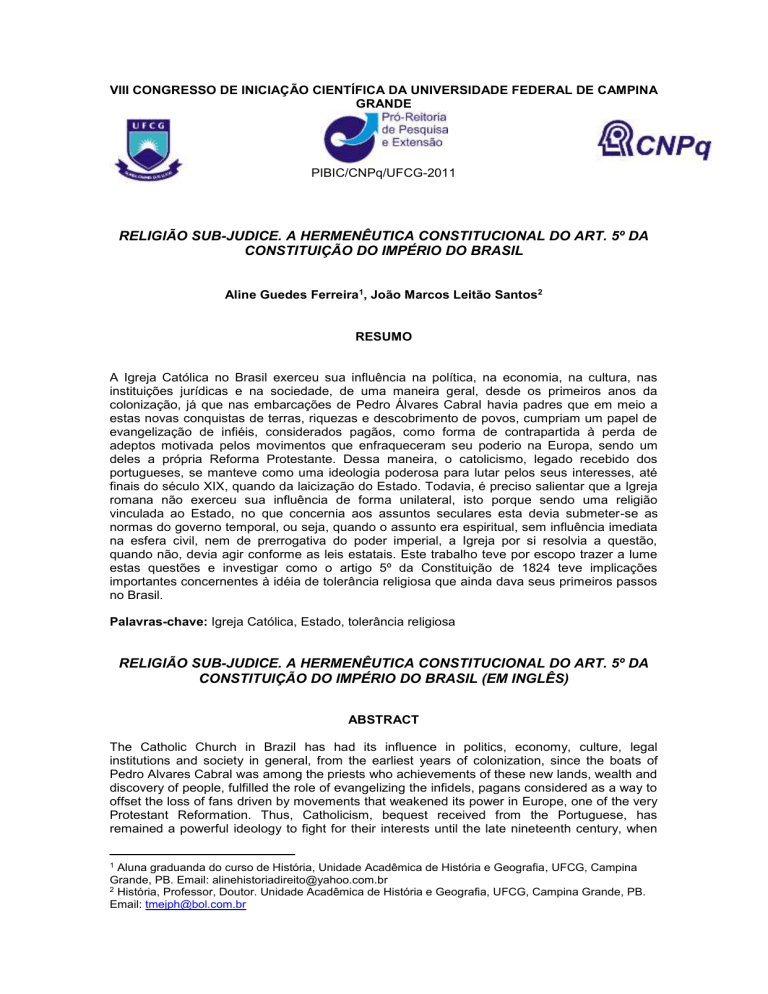
VIII CONGRESSO DE INICIAÇÃO CIENTÍFICA DA UNIVERSIDADE FEDERAL DE CAMPINA
GRANDE
PIBIC/CNPq/UFCG-2011
RELIGIÃO SUB-JUDICE. A HERMENÊUTICA CONSTITUCIONAL DO ART. 5º DA
CONSTITUIÇÃO DO IMPÉRIO DO BRASIL
Aline Guedes Ferreira1, João Marcos Leitão Santos2
RESUMO
A Igreja Católica no Brasil exerceu sua influência na política, na economia, na cultura, nas
instituições jurídicas e na sociedade, de uma maneira geral, desde os primeiros anos da
colonização, já que nas embarcações de Pedro Álvares Cabral havia padres que em meio a
estas novas conquistas de terras, riquezas e descobrimento de povos, cumpriam um papel de
evangelização de infiéis, considerados pagãos, como forma de contrapartida à perda de
adeptos motivada pelos movimentos que enfraqueceram seu poderio na Europa, sendo um
deles a própria Reforma Protestante. Dessa maneira, o catolicismo, legado recebido dos
portugueses, se manteve como uma ideologia poderosa para lutar pelos seus interesses, até
finais do século XIX, quando da laicização do Estado. Todavia, é preciso salientar que a Igreja
romana não exerceu sua influência de forma unilateral, isto porque sendo uma religião
vinculada ao Estado, no que concernia aos assuntos seculares esta devia submeter-se as
normas do governo temporal, ou seja, quando o assunto era espiritual, sem influência imediata
na esfera civil, nem de prerrogativa do poder imperial, a Igreja por si resolvia a questão,
quando não, devia agir conforme as leis estatais. Este trabalho teve por escopo trazer a lume
estas questões e investigar como o artigo 5º da Constituição de 1824 teve implicações
importantes concernentes à idéia de tolerância religiosa que ainda dava seus primeiros passos
no Brasil.
Palavras-chave: Igreja Católica, Estado, tolerância religiosa
RELIGIÃO SUB-JUDICE. A HERMENÊUTICA CONSTITUCIONAL DO ART. 5º DA
CONSTITUIÇÃO DO IMPÉRIO DO BRASIL (EM INGLÊS)
ABSTRACT
The Catholic Church in Brazil has had its influence in politics, economy, culture, legal
institutions and society in general, from the earliest years of colonization, since the boats of
Pedro Alvares Cabral was among the priests who achievements of these new lands, wealth and
discovery of people, fulfilled the role of evangelizing the infidels, pagans considered as a way to
offset the loss of fans driven by movements that weakened its power in Europe, one of the very
Protestant Reformation. Thus, Catholicism, bequest received from the Portuguese, has
remained a powerful ideology to fight for their interests until the late nineteenth century, when
1
Aluna graduanda do curso de História, Unidade Acadêmica de História e Geografia, UFCG, Campina
Grande, PB. Email: [email protected]
2 História, Professor, Doutor. Unidade Acadêmica de História e Geografia, UFCG, Campina Grande, PB.
Email: [email protected]
the secularization of the state. However, it must be noted that the Roman Church did not exert
its influence unilaterally, because this is a state-related religion as concerned with secular
matters it should submit to the rules of temporal government, ie, when the subject was spiritual
without immediate influence in the civil sphere, nor the prerogative of the imperial power, the
Church itself solve the issue, if not, should act as the state laws. This work was scope to bring
to light these issues and investigate how the Article 5 of the Constitution of 1824 had important
implications concerning the idea of religious tolerance that still was in its infancy in Brazil.

